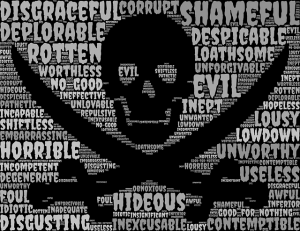 The late Sen. Eugene McCarthy once said that only two kinds of religion are permitted in America: strong beliefs vaguely expressed or vague beliefs strongly expressed. In a similar way, it could be said that the same formula applies to political beliefs.
The late Sen. Eugene McCarthy once said that only two kinds of religion are permitted in America: strong beliefs vaguely expressed or vague beliefs strongly expressed. In a similar way, it could be said that the same formula applies to political beliefs.
Keeping everything vague is the basis of a general consensus which supposedly allows everyone to get along. It appeals to a broad sector of American society that wants to neatly sidestep sticky theological and political issues, and pragmatically get around to the business of the pursuit of happiness and the prosperity of the nation. Such an attitude facilitates a willingness to work with anyone who will make a deal.
Is Technology Ruining Your Life? Take A Quick Quiz To Find Out By Clicking Here.
With such a mindset, it is no surprise that many Americans are experiencing difficulty understanding the ISIS threat. Having so long followed a “get-along” policy, they find it inconceivable that someone would deliberately break all the rules and not seek to get along. Indeed, such Americans are prepared to be very flexible by considering all sorts of bizarre alternatives as long as they are vaguely expressed, but they are mystified when strong beliefs are strongly expressed.
As a result, most people do not have an explanation for ISIS. They simply attribute the problem to “extremism” that results in irrational behavior. Extremism happens when confused young people undergo a mysterious process of radicalization that turns them into terrorists. The solution offered is to eradicate extremism (using extreme means if necessary) and support any form of moderate alternatives (even to the point of using immoderate means).
There are two problems in dealing with the extremist threat in this manner.
The first is that it fails to delve deeply into the reasons why extremists believe in what they do. It does not consider what is believed but rather how it is believed. The issue is the intensity of belief, not its radical message.
The danger in holding such a position is that its advocates tend to assume that any belief strongly held is irrational and must be eradicated. Thus, for example, they will attach the extremist ISIS label to Christians and any others who believe in something strongly. In so doing, it makes any proportional reaction very difficult since it is hard to fight if one believes in nothing.
The second problem is that advocates of this position go to the extreme of assuming that the only way to fight strong beliefs expressed strongly is to hold vague beliefs expressed vaguely. Thus, they will do anything to return to the blessed ambiguity in which they find safety. They will, for example, insist that the Islamic State is not really Islamic or hold that more inter-religious dialogue is needed. In any conflict, they will frantically look for “moderates” to support with the wishful thinking that they will prevail over the radicals and the whole thing will go away.
But alas, in this new world of extremists who behead journalists, the rules have changed. The politics of vagueness is a losing strategy that leads to concession, naiveté and defeat. There is no getting along with those who do not wish to get along no matter how hard one tries to wish it away.
Extremism exists because today’s postmodern world fails to provide meaning to life. Young people desire something to live for, and thus look for strong ideals expressed strongly. Extreme Islam provides them with not only strong ideals but wrong ideals to fill the void. Its tech-savvy militants express these ideals not strongly but savagely by breaking the civilized rules that still govern the world and using the very technology of progress to broadcast their barbarism across the hated West.
What is missing are right beliefs expressed strongly that are worth fighting for. And the West has those right ideas that now more than ever need to be expressed rationally, strongly and unapologetically. These ideas include the rule of law, a strong moral code based on natural law, representative government, Christian charity and a passion for justice—all the fruits of Christian civilization.
But the West has lost the will to fight for these ideas, which are the very foundation of the present order. And that is the greater threat. Much more dangerous than the paltry army of ISIS terrorists is the West’s fear of affirming Christian principles strongly.
present order. And that is the greater threat. Much more dangerous than the paltry army of ISIS terrorists is the West’s fear of affirming Christian principles strongly.


